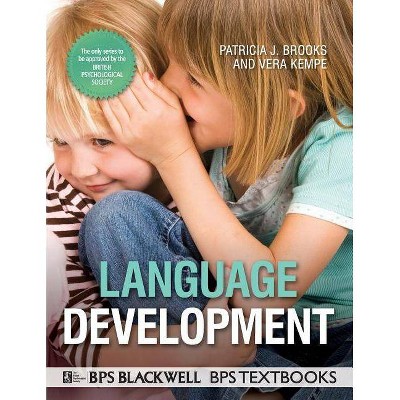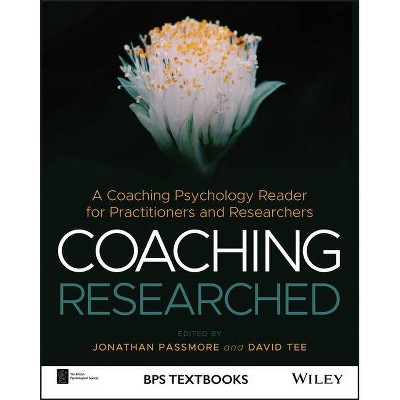Language Development - (BPS Textbooks in Psychology) by Vera Kempe & Patricia J Brooks (Paperback)

Similar Products
Products of same category from the store
AllProduct info
<p/><br></br><p><b> About the Book </b></p></br></br>"An accessible introduction to language development aimed at a wide audience of students from different disciplines such as psychology, behavioural science, linguistics, cognitive science, and speech pathology. It requires only minimal knowledge of psychology, and is intended for undergraduates from the second year of studies onwards. The wide accessibility to undergraduates is achieved by avoiding technical terminology when possible and explaining all crucial concepts in the text. From the first moment of life, language development occurs in the context of social activities. This book emphasises how language development interacts with social and cognitive development, and shows how these abilities work together to turn children into sophisticated language users--a process that continues well beyond the early years. Covering the breadth of contemporary research on language development, Brooks and Kempe illustrate the methodological variety and multi-disciplinary character of the field, presenting recent findings with reference to major theoretical discussions. Through their clear and accessible style, readers are given an authentic flavour of the complexities of language development research.With such research advancing at a rapid pace, Language Development uncovers new insights into a variety of areas such as the neurophysiological underpinnings of language, the language processing capabilities of newborns, and the role of genes in regulating this amazing human ability. "--<p/><br></br><p><b> Book Synopsis </b></p></br></br>From the first moment of life, language development occurs in the context of social activities. This book emphasises how language development interacts with social and cognitive development, and shows how these abilities work together to turn children into sophisticated language users--a process that continues well beyond the early years. Covering the breadth of contemporary research on language development, Brooks and Kempe illustrate the methodological variety and multi-disciplinary character of the field, presenting recent findings with reference to major theoretical discussions. Through their clear and accessible style, readers are given an authentic flavour of the complexities of language development research. <p>With such research advancing at a rapid pace, <i>Language Development</i> uncovers new insights into a variety of areas such as the neurophysiological underpinnings of language, the language processing capabilities of newborns, and the role of genes in regulating this amazing human ability.</p><p/><br></br><p><b> From the Back Cover </b></p></br></br>"This is an outstanding book, based on an incredibly impressive range of detailed and thorough scholarship...The book will be invaluable to students encountering the field of child language for the first time, and it will also be a vital resource for anyone wishing to update their knowledge about the latest findings and current understandings in the field. The authors are to be congratulated on their remarkable achievement."<br /> --<b>Professor Martyn Barrett, </b> University of Surrey, UK <p><i>"A well-written introduction to the field of language development.As a textbook, it stands out by highlighting the social and communicative aspects of language from the very beginning and touching on them throughout. Covering everything from decoding the speech signal to language use and from brain development to sign language acquisition, it will surely attract many new students to the study of language development."</i><br /> --<b>Professor Morten H. Christiansen</b>, Cornell University, USA</p> <p><i>"This is an excellent discussion of the most important research in language development. The authors write clearly and concisely and cover an exceptionally wide range of topics, as well as providing up-to-date coverage of the most recent research in syntax, semantics and phonology. This authoritative text will immediately be placed on our undergraduate reading list."</i><br /> --Dr Julia M. Carroll, Associate Professor in Developmental Psychology, University of Warwick, UK</p> <p>From the first moment of life, language development occurs in the context of social activities. This book emphasises how language development interacts with social and cognitive development, and shows how these abilities work together to turn children into sophisticated language users - a process that continues well beyond the early years. Covering the breadth of contemporary research on language development, Brooks and Kempe illustrate the methodological variety and multi-disciplinary character of the field, presenting recent findings with reference to major theoretical discussions. Through their clear and accessible style, readers are given an authentic flavour of the complexities of language development research.</p> <p>With such research advancing at a rapid pace, <i>Language Development</i> uncovers new insights into a variety of areas such as the neurophysiological underpinnings of language, the language processing capabilities of newborns, and the role of genes in regulating this amazing human ability.</p> <p>Key features include: </p> <p>A state-of-the-art overview of recent advances in the field</p> <ul> <li>A wide breadth of topics, including how infants discover language through interaction with others and how children learn to read and write</li> <li>Detailed coverage of how language development unfolds in special populations such as bilinguals, deaf children, and children with language impairments.</li> <li>A comprehensive summary of each chapter with a carefully constructed list of further readings that encompass key studies</li> <li>Methodology boxes describing crucial research methods for a given topic</li> </ul> <p>Additional resource materials to accompany this text are available at</p> <p>www.wiley.com/college/brooks</p><p/><br></br><p><b> About the Author </b></p></br></br><b>Patricia Brooks</b> is a Professor at the College of Staten Island. She conducts research in the areas of language development in children, second language learning in adults, and speech production and comprehension. On-going research projects explore (1) speech perception in children with Autism, (2) lexical access in children with Specific Language Impairment, (3) individual differences in adult second language learning, and (4) comprehension errors in sentence processing. Dr. Brooks joined the CSI faculty in 1997 after completing post-doctoral fellowships at Carnegie Mellon University and Emory University. She was appointed to the CUNY Graduate Center faculty in 1999, and is active in the Ph.D. programs in Developmental Psychology and Cognition, Brain & Behavior. <p> <b>Vera Kempe</b> is a Professor and Chair in Psychology of Language Learning at the University of Abertay, Dundee. She has held posts at Carnege Mellon University, the University of Toledo, SUNY Oswego, and the University of Stirling. She has published extensively within her research areas, which include: the role of child-directed speech in language acquisition; crosslinguistic research and neural network modeling of language learning and processing; first and second language vocabulary acquisition and learning of inflectional morphology; Individual differences in language learning and in child-directed speech; emotion and communication.</p>
Price History
Price Archive shows prices from various stores, lets you see history and find the cheapest. There is no actual sale on the website. For all support, inquiry and suggestion messages communication@pricearchive.us




















